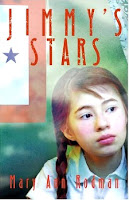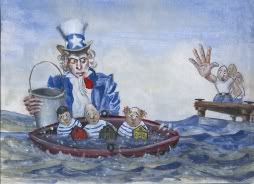I hate to cook. Period. I have mageirocophobia,the cook's equivalent of stage fright. Just knowing that someone else is going to consume and judge what I am cooking turns me into a quivering pile of Knox gelatin. Then why do I own shelf after shelf of cookbooks?
To me, cookbooks are literature. My favorites are the organizational fundraisers, each contributor adding a little history. ("My mama always made this milk punch for Christmas brunch" or "Uncle George used to stir up this stew on hunting trips.") Family tales aside, each recipe really is a potential story. The ingredients form a cast of characters waiting for the right circumstances...a specific way of combining, a certain degree of heat...to become something delicious and memorable. Thank goodness my husband does cook.
For someone who doesn't cook, food and recipes are an integral part of most of my books. I have my mother to thank.
I fear cooking. Mom hated it. I remember finishing lunch at the kitchen table, while Mom went into meltdown mode over supper, five hours away. With her head inside the ice-encrusted maw of our non-self-defrosting refrigerator freezer, Mom shuffled through frozen bricks of meat and vegetables, muttering "What can I make for supper?" Finally, she would extract a couple of frost-covered, foil-wrapped bricks and with an exhausted sigh, toss them on the countertop to defrost. Mom had sentenced herself to making yet another meal.
Eventually I learned the source of Mom's distaste. During the Depression, my mother's mother (known as Maga to her grandchildren) ran a boarding house as a way of keeping food on the table for her family of eight. (If this sounds like a certain fictional character from the American Girl series...well, sorry. It's the truth!) My teen-aged mom served as Maga's sou chef, in cooking vast quantities of food, not only for her own family, but for a dozen or so boarders. That meant a hot breakfast, a hot supper, and a packed lunch for everybody. No wonder Mom hated cooking.
This also explained why all of Mom's recipes read"Yield 24".
"Frances, are you cooking for the Fifth Army?" Dad would ask, peering into an enormous vat or skillet or roaster pan. "You can reduce the recipes."
"Too much trouble," Mom would shrug.
I understood. Cooking was bad enough without adding a math exercise to the mix. Even though Mom was only cooking for three people, the food didn't go to waste. If we had hash on Monday (a good meat-stretching Depression era meal), we also had it Tuesday, Wednesday and Thursday. When I moved out on my own, Mom didn't offer me a file of heirloom recipes, and I didn't ask. I never wanted to eat Fried Salmon Patties or Scrapple again.

In fact, I didn't even think of those old boarding house recipes until I was writing
Jimmy's Stars. It suddenly dawned on my that Maga was running a boarding house through the World War II rationing. Sure, her boarders ration stamps helped out, but sometimes it didn't matter if you had the money and the stamps. The food just wasn't available. It was being sent to "the fighting boys overseas."
Aha! This explained Maga's "meat" l

Call me old fashioned, but this is the kind of story telling that I love. Filled with larger than life characters and slices of Americana, Richard Peck’s stories of Grandma Dowdel are ripe for reading aloud and reading again!
Joey and Mary Alice were shipped off from Chicago to their Grandmother’s house every August starting when Joey was 9 years old. As Joey said, “Being Chicago people, Mother and Dad didn’t have a car. And Grandma wasn’t on the telephone.” (p. 4) so Joey and Mary Alice would be put on the train and sent on to Grandma’s place.
Grandma Dowdel is a big woman who is incredibly self-sufficient. It’s 1929 when the stories start, and Joey and Mary Alice are mad that their folks wouldn’t let them parade past Al Capone’s bullet ridden corpse in Chicago. Little did they know that they’d be sitting in a room with a corpse when they hit Grandma Dowdel’s place. Turns out that Shotgun Cheatham died, and because of his name, some of the bigger newspapers took a liking to his obituary and wanted to find out just exactly who this fellow was. Grandma is the type of woman who likes to keep to herself, but when she hears that folks have been making up all kinds of stories about Shotgun, she lets Joey and Mary Alice in on the kind of man that Shotgun really was.
Then the reporter shows up at her door, and Joey and Mary Alice get a taste of the adventures in store living with Grandma. No sooner does she discount the story that folks in town have told the reporter, but she is spinning a yarn so deep that the kids simply can’t believe it. And the kicker is that they are now sitting in Grandma’s front room, with Shotgun’s corpse laid out for the town and the reporter to see.
This first story gets readers ready and on the edge of their seats for the rest. From make-shift wakes, to out pranking the Halloween pranksters, to beating the law at every turn, Grandma Dowdel will have readers chuckling and gasping out loud. Old fashioned everyday gardening, canning, hunting, community events, and life without the distraction of media pepper the text along with the realities of the Depression era. Wonderfully written, these stories beg to be read aloud. I can’t wait to read the next installment about the family that moves on in next to Grandma!
Who doesn't need a bailout these days? Sure, our hands are our fortune. I'll put my hands out to accept a little something to tide me over to the next century.
Batteries and snark included. (I am running low on both these days. My daughter lent me a camera tonight to photograph her winter chorus recital and of course three photos in, the dreaded "batteries low" warning popped up on the screen and that was that. As for the Snark-o-Meter, I'm desperately in need of a re-charging in that department as well. It's hard to be a easy-grinning saint in the city.)
There will be a piece published in next Sunday's New York Times Book Review--
see http://www.nytimes.com/2008/12/14/books/review/Greenberg-t.html?_r=1&ref=books --
that deftly touches on a new deal for writers in these troubled days-- and approaches the subject of a writer's bailout with a smile:
Enjoy the preview. See the Real Deal on December 14, 2008 (or you can read it all, here, and now.
"What would such a bailout consist of? In the 1930s, Franklin Delano Roosevelt started the Federal Writers’ Project, under which some 6,000 out-of-work writers were hired over a period of several years to write guidebooks, oral histories, ethnographies and the like, and in the process "describe America to Americans." The program not only kept American writers alive but seems to have helped them multiply, to the point where there are now, according to a survey released last summer by the National Endowment for the Arts, approximately 185,000 people in the United States who support themselves primarily as writers of books, plays, poetry, speeches and other literary matter. Thanks to this group, America has been described and redescribed so many times that I fear a kind of word-based Strategic Defense Initiative is taking shape above us, shielding us from harsher but more realistic foreign words and creating resentment among our allies.
I am not suggesting that a Rooseveltian approach to the writing crisis is inappropriate. Rather, we should look elsewhere in Roosevelt’s legacy for a modern solution. A good place to start would be the Agricultural Adjustment Administration. This entity recognized that an overcapacity of farms and farm produce was driving down crop prices, and that elimination of that overcapacity was needed."

Should artists and writers go to Washington and seek to re-invent the Federal Writers' Project? (I am only half-heartedly joking about this. If it worked for Franklin Delano Roosevelt, Eleanor Roosevelt, and their disciples...) How's this for a slogan: Brother, Can you Spare a Dime? or better yet: Brother, Can you spare a rhyme?
How to Muddle Through: Whenever you feel afraid there's another Depression just around the corner, whistle a happy tune while we all await better times:






